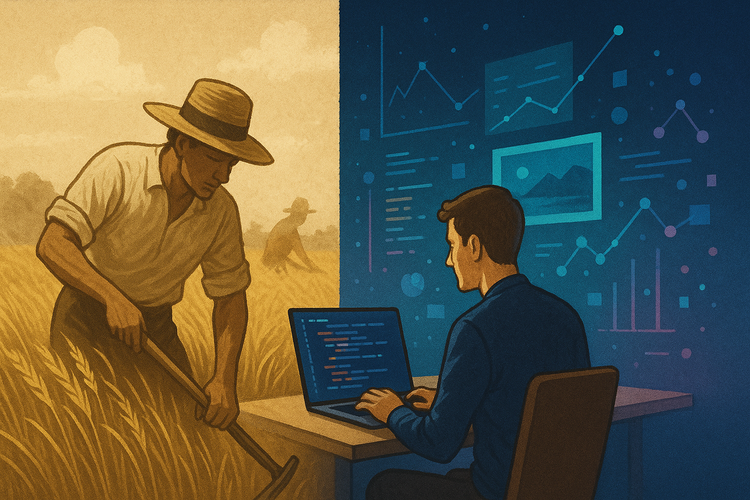Behind the Startup Screen: A Software Engineer's Leap into Founding

Introduction
I’ve spent most of my professional life as a software engineer. To this day, that’s still how I identify myself, even though for the past 16 months I’ve been navigating the new and challenging waters of founding a tech startup. This article isn’t about giving out advice or prescribing how to succeed in this transition. Rather, it’s about sharing the gritty, real experiences that have defined my journey from software engineer to founder—the unexpected realities that you don’t face until you’re in the thick of it.
Why am I writing this? Because becoming a founder has been a radically different experience than I anticipated. Whether you’re considering this path or just interested in what it entails, this story is for you.
Note: My statements in this article are based on, stories and advice from other founders, hundreds of articles, and five books on the subject of tech startups (see the the list at the end). But mostly my own experience, so please treat it as such.
All you need is an idea
In the world of tech startups, there’s a prevalent myth: “All you need is an idea.” Well, let me set the record straight—nobody gives a f#$%k about your ideas! It might sound harsh, but it’s the reality I faced. If you think you have an Earth-shattering, industry-defining idea that will change humanity, prepare for a surprise: nobody cares. I was genuinely worried that sharing my idea would lead to it being stolen. But that fear was unfounded.
Here’s what I’ve learned: it’s far more costly to keep your idea to yourself than to share it. Why? Because ideas are cheap. If it was 1994 and you knew everything about how Amazon was built and the market it would capture, could you really replicate its success just from the idea alone? Unlikely. Amazon wasn’t the first to sell things online, and the idea alone didn’t make it a behemoth.
It is not about your idea, it is about execution! You might have a vision hundreds of years ahead, mapped out. Try articulating that to people who care about you, let alone strangers.
Build It and They Will Come
Nope, they won’t. Just as “nobody gives a s$%^t about your ideas,” the same harsh truth applies to your creations. We often hear tales of icons like Steve Jobs, who seemingly never asked users what they wanted, creating masterpieces on intuition alone. However, the full story is more complex—not everything they touched turned to gold.
And let’s face it, the odds that you or I are the next Steve Jobs or Elon Musk are slim. That’s just statistics. Most of us are, by definition, ordinary—the norm.
Even if you craft something flashy, conduct in-depth market research, hire the best consultants, and secure billions in investment, failure remains a stark possibility. Ultimately, it’s the users who decide whether your product succeeds or not.
Show your product to the users as soon as you can, and be prepared for disappointment!
Searching for Product-Market Fit (PMF)
Finding Product-Market Fit (PMF) feels like trying to catch a black cat in a dark room. It’s hard, and even when you think you’ve grasped it, you might not be sure if it’s really in your hands. PMF, as I’ve come to understand it, is when a specific demographic discovers your product and starts clamoring for more—they find bugs, demand features, and can’t seem to get enough, despite the imperfections.
In my journey, grappling with PMF has been like trying to make a key for a lock I’ve never seen. The odds are daunting. Data suggests your chances of finding PMF are about 22%, and they don’t improve much even if you pivot after failing. If you hit it right, your chances for the next feature or product improve to 34%.
This pursuit is critical; without PMF, what you’re working on might as well be a “science project.” It’s that elusive goal that can mean the difference between a thriving business and a forgotten endeavor.
Team Dynamics in Startups
This is the second hardest thing I have to disclose.
I went on this journey alone. I have very good advisors and a solid network of high-skilled professionals I can ask for advice. But full-time, only me.
The thing is, I am not a recent college graduate. The people I trust, work well with, and would go in business with, all have "golden handcuffs". They can't just take no pay for who knows how long. This is crazy, isn't it? Why would you work overtime for possibly years with no compensation, and actually have to pour your own savings into this?
If you have never found a company, I ask you to imagine this: You have decided to fund a company, and you wake up that day that should be the first day of this journey. You are not anybody else, you are you, in the place you live, nothing changed. Now I want you to think about what you do now.
Jan 3, 2023, this was me. I decided to build a magical thing that would change the way people build software. I thought I needed to use Machine Learning, but I am no expert. Do I need to find investment? Do I need to incorporate a company? What about those accelerators? Maybe I should patent my invention? Do I need a company website?
Facing every decision and setback alone magnifies the emotional and mental toll. It’s not just about managing the workload but also enduring the highs and lows that come with forging a new path in the tech world.
Emotional Rollercoaster
Whenever I heard this term before, I never actually got it. I mean, I got it theoretically, but never felt it, at least not like this. I went from euphoria "This is the best job in my entire life!" to "I want to crawl under a bed, and cry myself to sleep."
Over time I managed to tame it, now I notice when I start going down, and adjusting the trajectory, but it is still happening.
And it is not just me, literally everyone who was a founder shared the same story. See normalcy is everywhere. I once talked to another early-stage founder, here is his story. Spent 6 months searching for a co-founder. Went to a trial project with 5 candidates during that time, and ended up with one. After another 6 or so months of working together, the co-founder left, the girlfriend left, and that entrepreneur shut down the operation and disappeared, can't reach him anymore.
Here is how I describe the feeling of being an early-stage startup founder: I am driving a car with no windows. None of the meters work, so I don't know the speed, RPM, or engine temperature, nothing. I need to get to my destination, but I am not sure if I am even moving, or maybe I am moving too fast and about to smash into a wall. I can talk to people, and they gladly give me advice, but they are not even in the car with me, nor do they see the car or where it is going.
Some advice is great, given by people who were in this car before. Their advice is usually subtle. People who have never been in this car also give advice, but that advice usually comes from watching this car on TV. Like, "Did you consider looking at the speedometer," or "Just make sure you are going in the right direction."
More Lessons Learned
Throughout this journey of founding a startup, the lessons have been plentiful and profound. Here are a few that stand out, not as directives, but as insights gained from the trenches:
- Appreciation for the Effort: I’ve gained immense appreciation for any product that ever made it to market and for the people behind it. While I may not automatically respect every founder, I bow deeply to the effort and perseverance it takes.
- Networking is important. I knew it was, but I did not know how much and why.
- People Are Everything: People who work with you, support you, disagree with you, use your product, etc. Tech is secondary, no matter how advanced, flashy, or cool. People are everything!
- Focus is saying "No". Have I mentioned that there is a lot to do? You never have time for everything in general, as a founder, you do not have time for anything. The only definition of focus, that works for me is saying "No" to all the things that are not essential and critical.
- Dealing with Rejection: I've been rejected before, for all sorts of things, the only way not to, is not to try anything. Rejection dominates interactions as a founder. You are lucky if people want to even engage with you. Even if they reject you it feels like a win already. It still hurts sometimes though.
Conclusion
It might feel depressing and sad, but it is just very, very hard. This isn’t “just a job;” it’s much more, but unless you’ve tried it, you would have a hard time understanding. It’s like having kids; you have no idea what it is until you have them.
This is the best and the hardest “job” I’ve ever had. This is one role that you can’t be overqualified for because it is not one job; it is all the jobs people have at a company, and you have to do all of them.
So why do it?
For me personally, it began with a belief. I had an idea, formulated it, prototyped it, and talked to people about it. It took over me. I could not imagine building software as I did before, because I knew there was not just a better way, but a revolutionary approach that completely transforms the standard! It’s like if you’ve seen a 4K OLED display and then have to go back to an old CRT (if you don’t know what a CRT is, you are too young for this reading ;)).
Then I built it, and it turned out better than I envisioned. I want the world to shift gears, maybe not with Micro and Svtoo, but I cannot pretend that this change did not happen, knowing what I know and seeing what I have seen.
So, I keep grinding, one foot in front of the other, day in, day out, without pay, health insurance, paid vacation, or holidays. For the last 16 months and 27 days, I’m not planning to stop, at least not yet.
Are you interested in knowing more? Have you ever attempted to build a company? Are you considering or dreaming about it? Please share your thoughts and questions in the comments.
References
Here is my entrepreneurship-related list (in order of preference):
- The Founder's Dilemmas. I like that it is data-driven. The author tells stories of real companies, but instead of basing the outcomes on anecdotal evidence, he uses his vast dataset to provide insightful analysis of decisions/outcomes.
- Fall in Love with the Problem, Not the Solution. Clearly outlined guidelines and real stories from the author who has successfully created multiple unicorns. A bit one-sided, obviously, but still very good.
- Lean Startup. I think this is the most well-known book on the subject.
- Company of One. This is an interesting take on the subject; if I had read it before I started, I would have gone that way, but not with what I am doing right now.
- The Minimalist Entrepreneur, honestly, is more of the same. I guess at some point, it gets repetitive :)
PMF: I recommend watching this talk to know more.


Comments ()